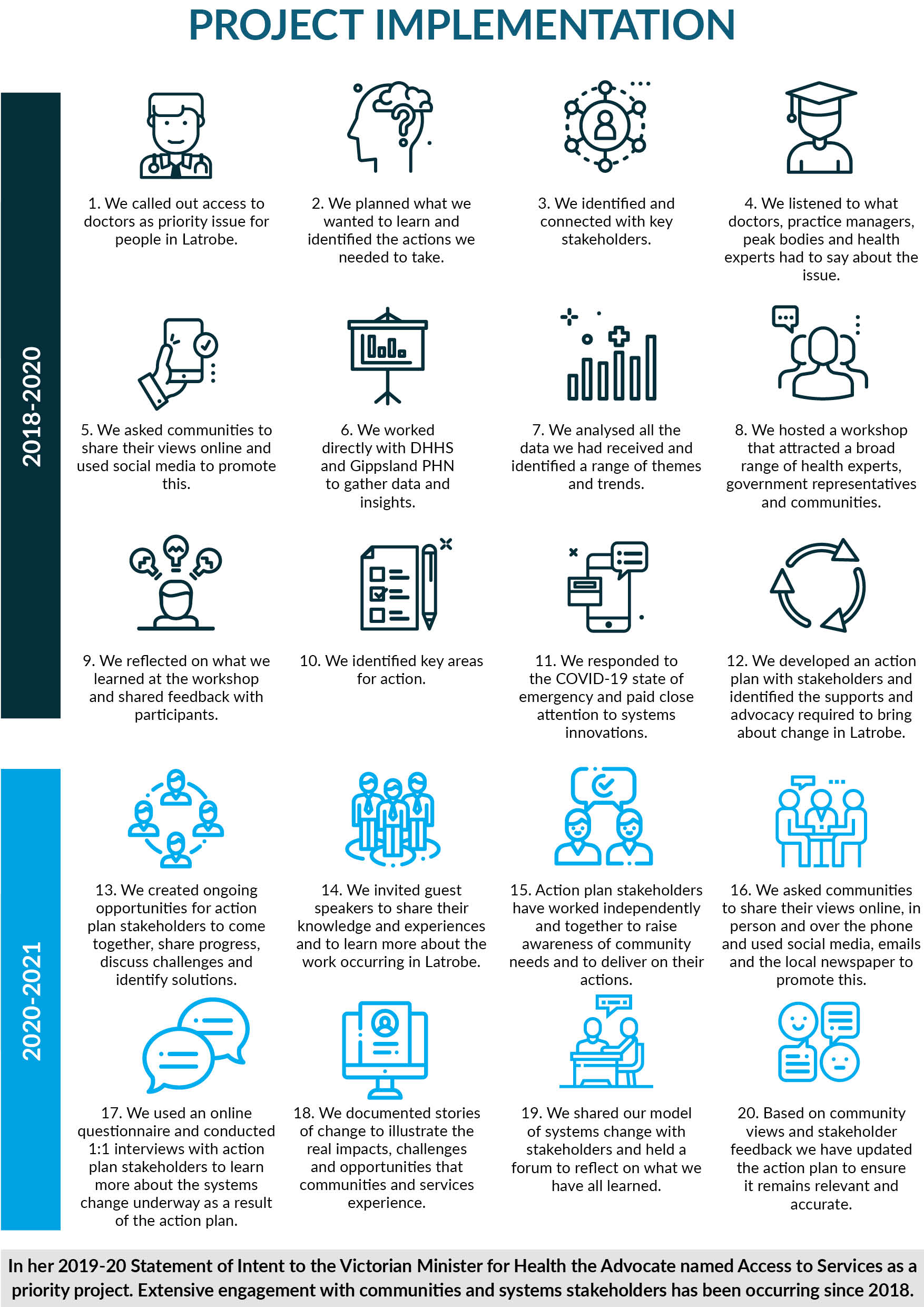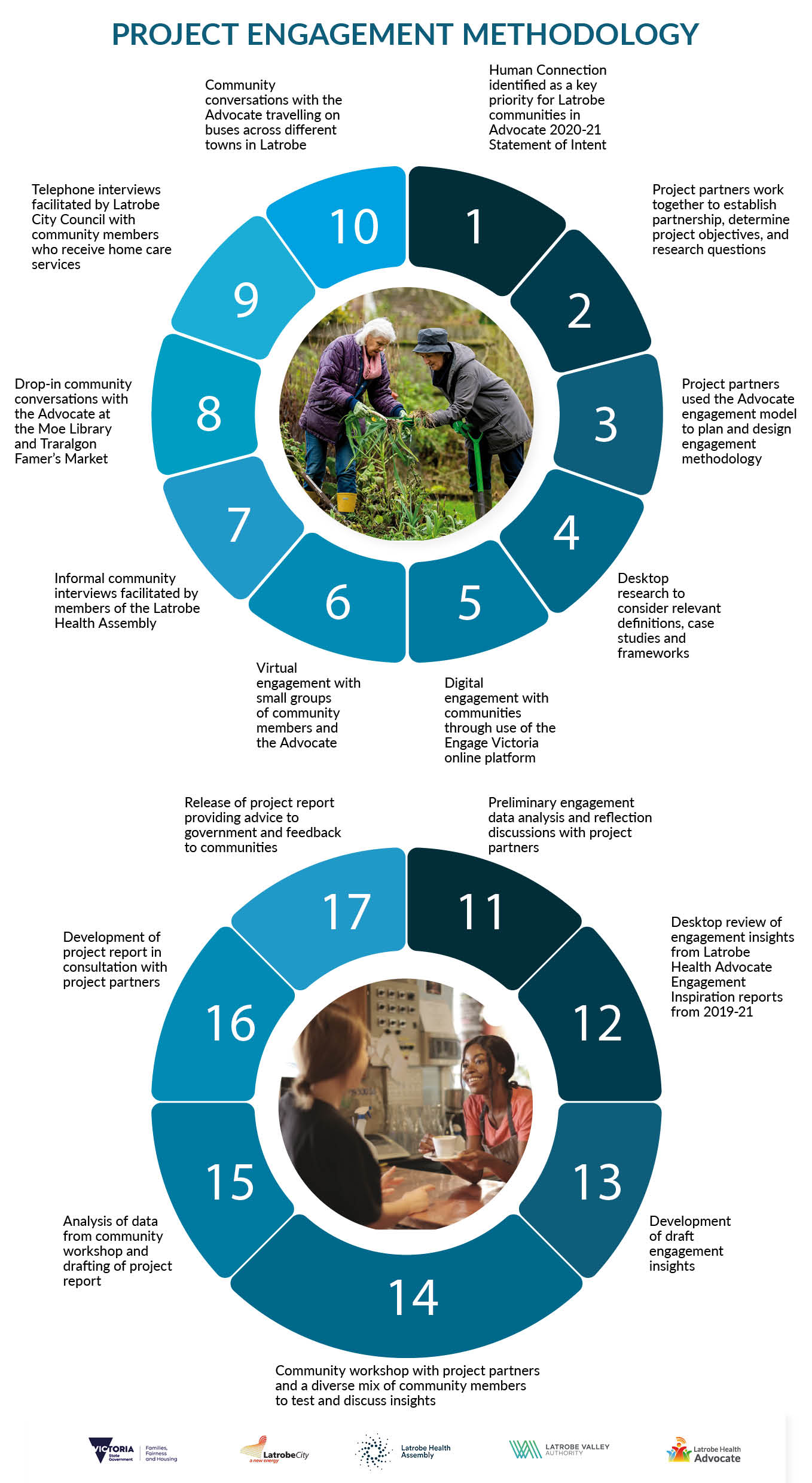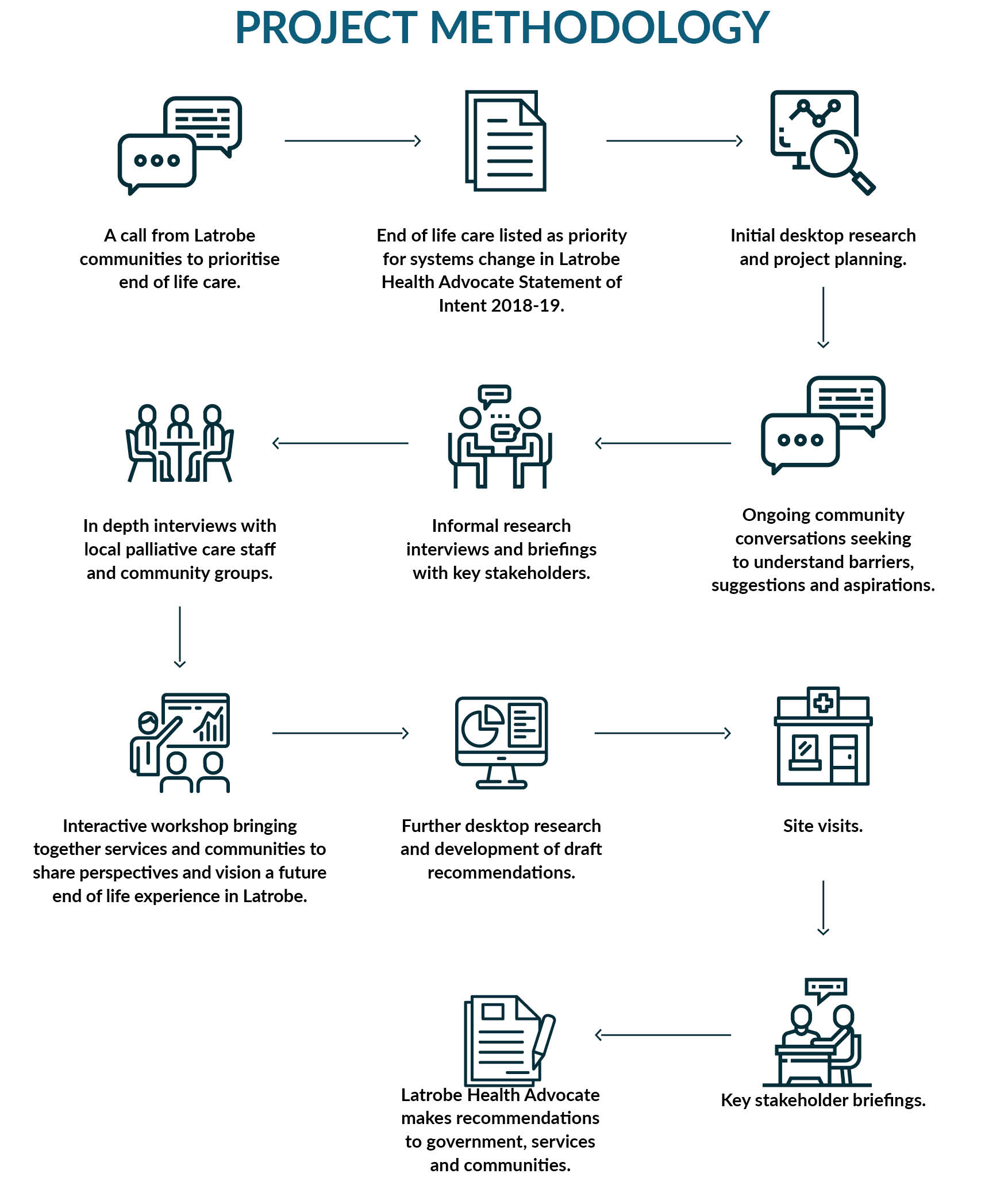

Latrobe Health Advocate: Fostering equitable and healthy societies through international collaboration
Article highlights
How can you support a community to have better health outcomes? What if their poor health outcomes result from generational disadvantage? These were the questions that @LHAdvocate faced in the wake of the Hazlewood mine fire
Share article.@LHAdvocate was an international subject matter expert in @CPI_foundation's "Earning Trust to Build Equitable and Healthy Societies." Read the recommendations they shared with the cohort on collaborating with communities to address health challenges.
Share article"It is vital that [...] change occurs in a fair & equitable way that prioritises the wellbeing of all members of the community. Regional transition requires collaboration between government, industry & community." Latrobe Valley & Gippsland Transition Plan
Share articlePartnering for Learning
We put our vision for government into practice through learning partner projects that align with our values and help reimagine government so that it works for everyone.
How can you support a community to have better health outcomes? What if that community's poor health outcomes result from long-standing generational disadvantage? How do you repair trust between community and government when people don’t feel heard?
These were the questions that governments in Latrobe Valley faced in the wake of the Hazlewood mine fire, a devastating event that underscored the need for immediate action and prioritisation of health and wellbeing. Within this challenging context, the Latrobe Health Advocate (the Advocate) emerged as a trusted voice to champion the community's needs.
Established to bridge the gap between the community and the government, the Advocate brought forth expertise in community engagement, power-sharing, and innovative solutions. Their journey not only transformed the health landscape but also inspired an invitation to the Earning Trust to Build Equitable and Healthy Societies (ET4HS) program by the Centre for Public Impact, raising the question: How can Latrobe Valley's experience benefit U.S. cities grappling with similar community health challenges?
A global learning journey with Latrobe Health Advocate
The Advocate, recognized for their collaborative leadership in systems change, human-centered design, and innovation, was invited by the Centre for Public Impact's ET4HS to share insights with several U.S. cities addressing community health issues. They presented their innovative approach implemented through the Latrobe Health Innovation Zone (LHIZ) to address health disparities and garner community support.
This engagement highlighted the importance of community-driven health solutions and the challenges faced, such as siloed approaches and addressing agency and community blindness to marginalised groups' challenges. The focus was on influencing services and decision-makers and utilising community voices as valuable data.
Based on the Latrobe Health Advocate’s experience, we recommend the following to collaborate with and engage the community in health challenges effectively:
Co-design a way of working: When the office of the Latrobe Health Advocate was first established in June 2018, the Advocate committed the Victorian Minister for Health and communities in Latrobe to undertake a codesign process to determine a way of working.
An essential part of the role of the Advocate is to listen to and understand the views and needs of people in Latrobe. For the Advocate, the only way to do this was first to understand how people in Latrobe wanted their voices heard and why it is important to them. In particular, people who may not usually have their voices heard or may not recognise their voices. The Office of the Advocate partnered with The Australian Centre for Social Innovation (TACSI), an organisation with a proven ability to work with communities, walking alongside and learning from people in their everyday lives to create community-led change.
Partner with organisations and local communities to elevate the people's voice: The Advocate partnered with local communities and people living and working in Latrobe who bring their expertise to the discussions. The work would not have been possible without involving communities from the very beginning. The partnership assisted in creating an environment where the feedback, ideas, and experiences of local communities are valued equally alongside clinical and technical expertise and enables creativity and change within the Latrobe Health Innovation Zone.
Try various methods to hear from community members: The Advocate hears from people daily. The engagement with the community occurs through various channels, individually or at group meetings, over a cup of coffee at a café, in the office, and at peoples’ homes. The Advocate has visited Neighbourhood Houses and learning centres across Latrobe and visited workplaces and health service providers.
Meet people where they are (physically) in community engagement: One of the most popular ways that the Advocate has heard the voice of communities has been while travelling on the buses. During the COVID-19 pandemic when movement was restricted, these conversations occurred over Facetime, Zoom, Teams, and other online platforms and telephone calls.
Shared learning through Quarterly Community Engagement Reports: The Advocate reports back to the community on their conversations and usually highlights the top 5 aspirations for that quarter. Many more goals have been identified, which are also communicated as they provide a rich picture of what people in Latrobe strive for. The Advocate shares community engagement insight with various stakeholders who have a role in improving the health and wellbeing of people in Latrobe. Those stakeholders include people in various positions, including decision-making, policy development, and service delivery. They are from local, regional, state, and federal contexts within industry, government, community, and education sectors.
Effective collaboration leads to positive outcomes and interventions for the community
The Advocate's role involves collaborating with stakeholders to develop and implement strategies that promote health and wellbeing within the Latrobe Valley community. Major campaigns that the Advocate has initiated in response to community voice include Access to Services, Human Connections, and Palliative Care.
Access to services
Access to services became a priority for the Office of the Latrobe Health Advocate in response to the voices of Latrobe communities, GPs, and health services who reached out to express their concerns and discuss their challenges. In 2019, the Advocate committed the Minister and the people of Latrobe to identify the systemic underlying issues that impact how people in the region access GPs. The Advocate engaged with communities, GPs, practice managers, peak bodies, health experts, and State and Commonwealth government bodies to hear experiences and views and gather data and insights.
Improving Access to Services in Latrobe is a collaborative action plan demonstrating a shared commitment to improve access to GPs. Since the plan was established, the Advocate Office has convened regular stakeholder forums where action plan agencies have come together to provide updates about the work, discuss strategies to advance systems change efforts, and identify ways to address challenges.
Everyone who contributed to the access to services plan is committed to achieving better health and wellbeing outcomes for Latrobe communities, improving the training and accreditation pathways and working conditions for GPs. The plan reflects the goodwill and spirit of cooperation of local doctors, communities, health services, peak bodies, universities, training providers, and all levels of government.
Annual progress reports have been released detailing the wealth of work undertaken in Latrobe and the region of Gippsland more broadly to implement the project. The reports have included stories of change and refined actions. The interconnectedness of the four themes demonstrates the importance of understanding the system to influence change. The four themes are:
Improving training and accreditation pathways for doctors in Latrobe.
Enhancing and promoting the liveability of Latrobe and strengthening local recruitment systems.
Building health and digital literacy and enabling greater responsiveness to community voice.
Local system design and innovation, reducing the burden on the emergency department and creating a multidisciplinary business model for the future.

Human connections
In 2019-20, the Advocate identified social isolation and loneliness as priority health issues impacting Latrobe communities. The Human Connections Project is a collaborative campaign between agencies within the LHIZ. It takes a place-based approach to identify opportunities to increase social connections and participation in Latrobe. The project aims to understand better the context and opportunities for human connection in Latrobe and the population health impacts of loneliness and isolation.
Project partners have worked together and independently, including developing a research paper to improve community connections. The Human Connections Report was released in 2021, containing the following five themes with relevant insights and advice:
The impact of human connections on overall health and wellbeing
Human connections with people, places, and other
Events, activities, and experiences
Connecting through community groups, clubs, and volunteering
Enablers of human connection.
A celebratory Storybook was later released, promoting the work occurring in Latrobe to address the recommendations in the Human Connections Report and help people recognise the existing connections.

Palliative care
Palliative Care was identified as a priority for the Advocate in 2018-19, and Latrobe communities continue to talk about the need to improve end-of-life experiences at a local level. The Advocate committed to these communities and the State Government to identify opportunities to improve the system to meet expectations better and deliver on state and national policy directions.
In September 2019, the Advocate released a report, Achieving Victoria’s best end-of-life experience for people in Latrobe, which included five reform areas and twelve action recommendations. The recommendations were based on extensive community engagements, input from services and palliative care physicians, and desktop research.
The Advocate has released annual progress updates, recognising the work that had occurred in response to her recommendations and highlighting areas that had not yet been addressed. The Advocate acknowledges the efforts of local services and palliative care workers who have demonstrated their commitment to working together to respond to the aspirations of people in Latrobe.
There is no doubt that with the continued support of the Victorian Government, people in Latrobe and the broader Gippsland region will experience a consistently high standard of end-of-life care that is on par with what they deserve and is offered in places of their choice.

Addressing challenges and envisioning progress
“Transition is a process of change. In Gippsland, this will involve shifting from traditional industries to new, emerging industries; adopting sustainable practices; and adapting to new technologies and global trends. It is vital that this change occurs in a fair and equitable way that prioritises the wellbeing of all members of the community. Regional transition requires collaboration between government, industry, and community groups. It is important to work together to identify opportunities and develop strategies to achieve a prosperous future. There is a desire to create an economy that supports long-term benefits for everyone, regardless of their background or circumstances.’’ - Latrobe Valley and Gippsland Transition Plan - August 2023.
The Advocate played a pivotal role in shaping the Latrobe Valley Transition Plan (Latrobe Valley and Gippsland Transition Plan - August 2023 ), providing strategic direction through active involvement in various phases and elevating community voice within the Plan. Their contribution extended to Ministerial Roundtable discussions, community consultations, and Implementation Working Group (IWG) participation. The Latrobe Valley and Gippsland Transition Plan, emphasising its community-driven nature, was officially released, with the IWG actively working on creating an outcomes framework. The Advocate encouraged outcome measures tailored explicitly to vulnerable communities, ensuring inclusivity and progress monitoring.
The Transition Plan includes a focus on liveability that aligns with the Advocate’s priorities – an inclusive and safe environment; empowered and thriving communities that are diverse and socially cohesive; accessible and inclusive services for health and wellbeing; and integrated transport and reliable digital connectivity to enable the community to access the full benefits of digital innovation and inclusion.
The plan also highlights activity in the region that supports transition in Gippsland, including the following activities led by the Advocate:
Human Connections in Latrobe - a local approach for local communities;
Improving access to services in Latrobe and
The Application of the Social Determinants of Health.
Through collective engagement strategies, the Advocate facilitated the identification of emerging themes and issues, emphasizing the importance of region-wide planning and effective communication.
In essence, the Advocate's strong commitment to community wellbeing and equitable societies continues to impact profoundly, inspiring positive change locally and globally.
What’s next?
The Advocate provides independent advice to the Victorian Government on behalf of Latrobe Valley communities on system and policy issues affecting their health and wellbeing. The Office of the Advocate is in year 3 of a 5-year planning cycle that intends to foster an environment for effective self-advocacy. Working alongside the Department of Health, Latrobe Health Assembly, and Latrobe Health Innovation Zone (LHIZ) partners and community stakeholders, the Advocate will develop a strategic plan and outcome measures for the LHIZ. The priorities in moving forward are to track progress on addressing the social determinants of health through the production of a report card; advocate for community-endorsed recommendations to improve access to services, palliative care, and human connections; promote respectful community engagement in planning processes; progress issues raised by the community regarding transport; and review engagement approaches to support effective and inclusive self-advocacy in Latrobe. The commitment to build on engagement through the Advocate’s inclusive communities works to address the inequities that exist in some communities, including people living with disabilities, chronic conditions, people experiencing financial stress, family violence, LGBTIQ+, culturally and linguistically diverse people, younger people, people over 60 and Aboriginal and Torres Strait Islander communities.
Latrobe's ongoing journey towards community collaboration is a testament to the power of collective effort and the importance of involving the public in decision-making processes. While they have made significant progress, the journey is far from over. The tips shared here serve as valuable starting points for any government entity looking to enhance community engagement and co-create solutions to critical issues. In an age where transparency and inclusivity are essential, these principles offer a roadmap for fostering a stronger bond between the government and the people it serves. By actively seeking input, valuing diverse perspectives, and working together, we can pave the way for more effective governance and a brighter future for all. Latrobe's story is a reminder that progress is possible, and these tips provide the tools to help make it a reality.
##
About Latrobe Health Advocate – Championing community health and wellbeing
Jane Anderson was appointed the Latrobe Health Advocate by the Minister for Health in May 2018 and reappointed in 2021. The first of its kind in Australia, the role of the Advocate is to provide independent advice to the Victorian Government on behalf of Latrobe Valley communities on system and policy issues affecting their health and wellbeing. Jane provides community-wide leadership by enabling, mediating, and advocating for health improvements through health and broader system improvements and change.
The role of the Latrobe Health Advocate delivers on a key recommendation of the 2014 Hazelwood Mine Fire Inquiry, which found the health profile of the Latrobe Valley is poorer compared to other local government areas in Victoria. In light of this, several actions were proposed to improve service coordination and health outcomes in the region, including the appointment of the Latrobe Health Advocate, the establishment of the Latrobe Health Assembly, and the designation of the Latrobe Health Innovation Zone.
The role of the Advocate is a key mechanism of the Latrobe Health Innovation Zone, which is designed to give voice to community aspirations in the planning and delivering better health and wellbeing outcomes, and where a process of co-design with individuals and organisations is actively encouraged.
The Advocate hears from Latrobe communities about their health and wellbeing concerns and aspirations and what works for them regarding engagement. The Advocate listens to people experiencing disadvantage, people who may not usually have their voices heard, or people who may not recognize their voice. People have trusted the Advocate with their stories and inspired her to advocate for systems change to improve their health and wellbeing. The Advocate is committed to ensuring local services can respond to and support people and will continue working with them to identify and overcome any challenges or obstacles that may prevent this.
To learn more about the topics discussed in this article, read the Latrobe Valley and Gippsland Transition Plan, August 2023.
Earning Trust to Build Equitable and Healthy Societies is fostering international collaboration for health equity
The Centre for Public Impact’s Earning Trust to Build Equitable and Healthy Societies (ET4HS) program brings innovative health solutions from around the world and creates an international community of practice to help local governments address health disparities globally.
As part of the ET4HS program, cities from diverse corners of the globe are coming together to share their experiences, cultures, successes, and challenges in addressing health disparities. The objective is to facilitate cross-cultural learning and exchange best practices tailored to U.S. municipalities' unique challenges. The program aspires to create a more equitable and healthier society by connecting international solutions to local needs.
Beyond the scope of health improvements, the program emphasizes strengthening relationships between governments and their communities. This is not just a matter of better governance; it's about rebuilding trust and legitimacy. The ultimate goal is to enhance the effectiveness of governance by ensuring that the voices and needs of the people are heard and meaningfully considered.
Read the program report to learn more.
Written by:
You may also be interested in...


Latrobe Valley's mental health café: designed by the community, for the community
